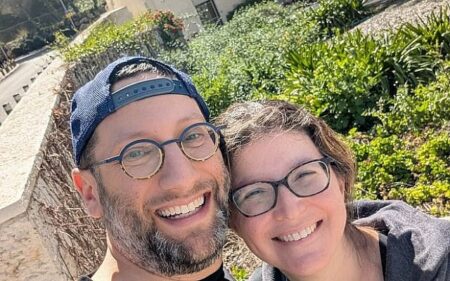Thinking of you

On August 31st, I finished 20 weeks of chemo for breast cancer. One week from yesterday, I will undergo a double mastectomy and reconstruction.
The experience has been intense and challenging. Physically, emotionally, and mentally. Individually and as a family. Treatment affects so much more than the body. It reshapes routines, priorities, and relationships.
As I reflect on these past months with my husband, Judah, I want to share some of what we have learned from others about what it means to help and care. Not because our situation is unique, but because these lessons feel relevant to all those supporting friends or family going through something difficult. We hope that sharing our perspective will help others who want to be there for someone facing a challenge of any kind.
Small gestures matter. We were struck by how deeply we appreciated thoughtful acts of kindness. A knock on the door with soup, fruit, or flowers. A message saying, “Thinking of you.” Shabbat afternoons when someone showed up with cookies, fruit, or just to spend time felt especially warm and meaningful. These moments gave us the sensation that the hands and thoughts of others were holding us up.
Be concrete and sincere when you offer help. Specific offers are much easier to accept than open-ended ones. It can feel overwhelming, in the middle of everything, to figure out what to ask for. The simplest offers made the biggest difference:
- “I am going to the store. Can I pick something up for you?”
- “I made extra dinner. Can I bring some over?”
- “We are taking the kids out. Want us to bring yours?”
If you cannot help, that is completely fine. It is better to be honest than to offer help that is not feasible or sincere. When help is practical and genuine, it lifts a burden instead of adding one.
Think about the whole family. Although I was the one receiving treatment, the ripples were felt by everyone. Friends who thought about the kids, offered a ride, arranged a playdate, or checked in about how the rest of us were doing gave us much-needed breathing room. In any difficult situation, the impact extends beyond the person directly affected.
Presence over perfect words. The “right words” are really hard to find, but showing up matters more than saying the perfect thing. A visit, a short message, a virtual hug, an emoji. All of these count. If you want to let someone know you are thinking of them, it is perfectly fine to just say that without asking for updates. Sometimes, a quick “thinking of you” and a heart emoji are all that is needed.
Presence is not limited by distance. Friends on different continents found ways to make us feel cared for. Sending a meal or flowers, or just checking in on WhatsApp. Distance does not have to impede conveying care.
Avoid assumptions and pity. It is easy to think, “They must have a million people around,” but when everyone assumes that, sometimes no one shows up. Each friend matters. Each small act has weight, and together they are woven into an effective safety net. At the same time, being supportive without falling into pity makes a big difference. Steadiness and genuine care help more than showing sadness on someone else’s behalf.
Reach out, but thoughtfully. Do not hesitate to reach out, even if you have not been in touch recently, and even if it took you time to do so. It is almost always comforting to know someone cares.
Try to see through your friend’s eyes. It is hard to know what someone needs unless you ask and listen. Sometimes the people themselves don’t even know what they need, but talking can help clarify needs, which are often small and specific: a certain lotion, help with cleaning, or motivation to exercise. When you are open to hearing those things, it becomes easier to offer help that truly matters. Sometimes that help takes surprising forms — a puzzle, a coloring book, a family game.
Physical and mental health are intertwined. Chemo was really hard on the body, but what surprised us was how much mental and emotional energy it demanded. Support on every level was significant. It was not only about the logistics of treatment, but about helping us stay focused, hopeful, and connected to normal life. Whether it is sickness, loss, or any other challenge, caring for someone’s emotional well-being can be just as important as helping with practical needs.
Looking back at the past six months, support is rarely about grand gestures. It is about truly seeing the other person, showing up consistently throughout their journey, in small and steady ways, and remembering that even the simplest act can ease someone’s burden.
Our journey is not finished, and our perspectives will continue to develop as we traverse our own road ahead. But we move forward carrying the lessons learned thus far and the strength we have drawn from so many around us.
